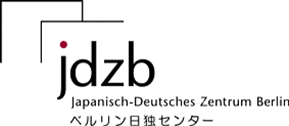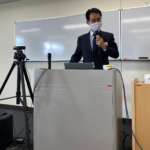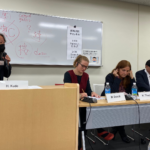Download
Co-organizer
Supported by


![]()
Registration Info
This is a past event. Registration is no longer possible.
DIJ Mailing List
Please subscribe below to stay informed about our research activities, events, and publications:
Inclusion of elderly citizens in German and Japanese Communities: civic engagement and the COVID pandemic
November 10, 2022
Organizing institutions
German Institute for Japanese Studies (DIJ)
Chuo University Grant for Joint Research (Kudo PJ)
Co-organizing institutions
Friedrich Ebert Stiftung, Tokyo
Japanese German Center Berlin (JDZB)
Social inclusion represents one of the fundamental challenges ageing societies like Japan and Germany confront. People, who retire, become cut off from an important part of their previous social environment. Many live in one generation or even single households. Lack of social interaction is known to have adverse effects on physical and mental health. But social inclusion can not only improve the health conditions of the elderly, it also offers seniors the opportunity to actively contribute to society through taking up work or through civic engagement. The social inclusion of elderly citizens depends to a large extent on neighbourhoods and local communities. They offer opportunities for social interaction and civic engagement, and they often organize the voluntary support for elderly citizens in need of care.
The two sessions dealt with the topics of civil engagement and the experiences from the COVID pandemic, respectively. In the first part, Cornelia Kricheldorff (Katholische Hochschule Freiburg) presented a concept of inclusion that deals with specific issues of old age. She pointed out that the concept of old age is to be understood diversely and that not all life realities of old people coincide. In this context, she highlighted ideas of inclusion of older persons in the context of participatory concepts of community and social engagement. Gerd Naegele (TU Dortmund) presented the contribution of Franz Müntefering (formerly Federal Minister of Labour and Social Affairs) on voluntary engagement of older people in Germany. He pointed out that older people not only represent a social problem, but could also be its solution. Older people were front-runners in civil society engagement and could be useful for society through participatory actions and at the same time enjoy it. In this context, it would be important to create opportunity structures in the municipalities where older people can participate accordingly. The third presentation in the first session referred to Tomoo Matsuda‘s (Mitsubishi Research Institute) idea of a “platinum society” and included some practical examples from different communities in Japan, such as the drummers’ group on Sado Island or the multi-generational housing project Share Kanazawa. He demonstrated how the participation of older people in social life can be valuable for the community, but also for the well-being of the people participating. Ikuko Fujita (Sanyo-Gakuen University) presented some dementia-friendly communities in Japan and referred to policy strategies that put more focus on the active participation of persons with dementia in the community and their self-determination. She spoke about the examples of the city of Fujinomiya, where community building activities include the voices of people with dementia, and the city of Omuta, where people with disabilities can work (for example, washing cars).
The second session focused on the experiences during the COVID pandemic. Martina Brandt (TU Dortmund) focused her contribution on informal assistance, including that provided by civil society. She showed how older people in particular were reluctant to help others during the crisis. The biggest fear of those interviewed would be to infect others. Measures to curb potential negative consequences such as loneliness could lie in strengthening communal care structures. Hildegard Theobald (University of Vechta) focused on caregivers in her presentation. She showed that Germany has difficulties recruiting professional workers, although there is no shortage of low-skilled care workers. Recent reforms in care have improved the conditions and social status (wages, training/professionalisation) of care, but at the same time there is a risk of a deterioration in the quality of the work if less trained helpers are used more. Norio Okada (Kyoto University) linked communities suffering from demographic decline in Japan (kaso chiiki) to the sanmitsu corona prevention measures during the pandemic. He explained that there were hardly any changes in life in these communities due to the COVID measures and outlined the idea of adaptive governance in this context. This means communities that are resilient to the pandemic. The example of Tottori Prefecture also showed that successful preventive measures could be taken at an earlier stage of the pandemic, regardless of government guidelines. Toshihiko Hasegawa (Future Health Research Institute) evaluated the Japanese COVID measures in the final contribution of the second session. He referred to the low mortality rate despite the high ageing rate and the course of vaccination in Japan, which was initially sluggish but finally more comprehensive than in Germany. He critically noted that there was, however, a non-negligible number of deaths that would cloud the otherwise positive balance due to other factors possibly related to the measures.
The final Q&A session led to a discussion on the possibility of mitigating the threat of loneliness during the pandemic. In addition, the adaptability of informal structures in smaller communities to crises and the special burden of the measures on young people were highlighted.
Franz Waldenberger (DIJ) closed the event by referring to the two major themes identified during the conference. First, he recapped challenges that had become apparent: on the one hand, the demographic development in both countries demanded more participation of older persons in community life, and on the other hand, the experiences during the pandemic had revealed some mistakes in crisis management. In addition, Waldenberger emphasised the approach taken during this research cooperation: no narrow comparative corset was deliberately imposed, for example to compare Japan with Germany; instead, both sides were to work on the questions of this conference independently and with their own chosen focal points, in order to provide a comprehensive picture of the different approaches.
Programme
13:00 Venue opening
13:30 Welcoming remarks
Toshikazu Kato (Vice-President, Chuo University)
Yoko Takahashi (Council member JDZB, President Japan Philanthropic Association)
Lothar Mennicken (Counsellor, German Embassy)
Ichiro Tekuramori (Counsellor, Cabinet Office)
Moderator: Hiroko Kudo (Professor, Faculty of Law, Chuo University)
14:00 Civic engagement and inclusion
Cornelia Kricheldorff (Professorin em., Katholische Hochschule Freiburg)
Gerd Naegele (Professor em., TU Dortmund)
Tomoo Matsuda (Research Director, Mitsubishi Research Institute)
Ikuko Fujita (Professor, Sanyo-Gakuen University)
Moderator: Franz Waldenberger (Director, DIJ)
15:20 Coffee/Tea break
15:50 Lessons learned from the Corona pandemic
Martina Brandt (Professor, Fakultät Sozialwissenschaften, TU Dortmund)
Hildegard Theobald (Professor, Universität Vechta)
Norio Okada (Professor em., Kyoto University)
Toshihiko Hasegawa (President, Future Health Research Institute)
Moderator: Hiroko Kudo (Professor, Faculty of Law, Chuo University)
17:10 Closing remarks
Franz Waldenberger (Director, DIJ)
17:20 End

